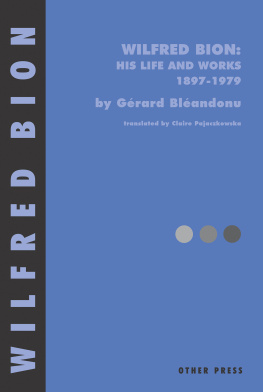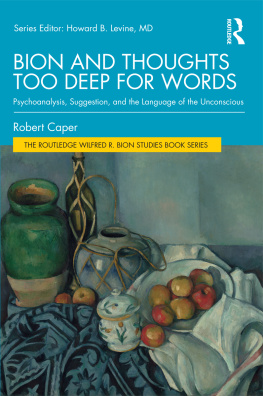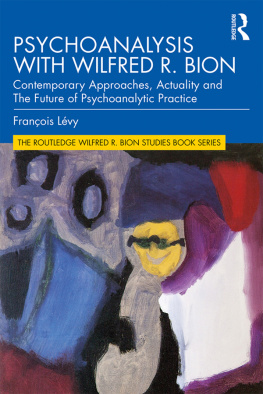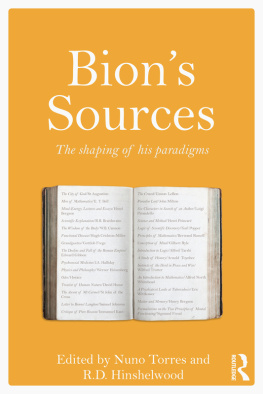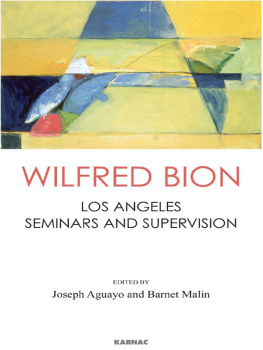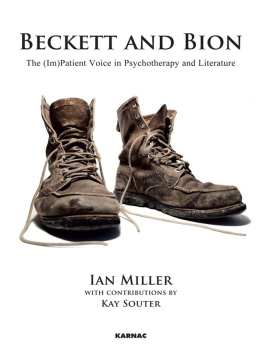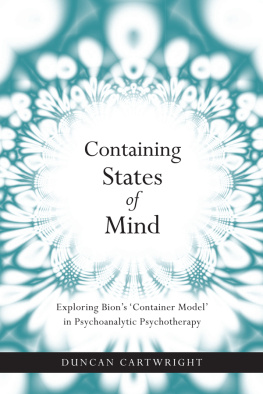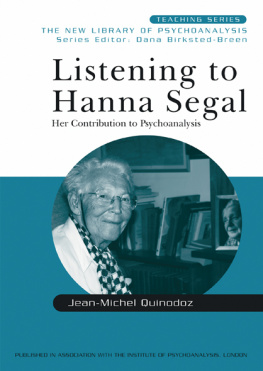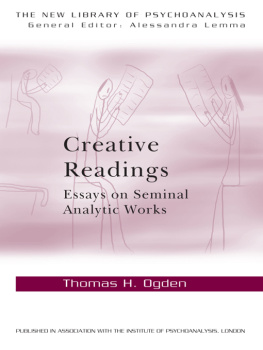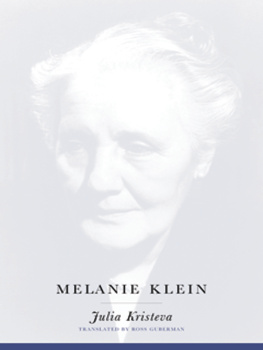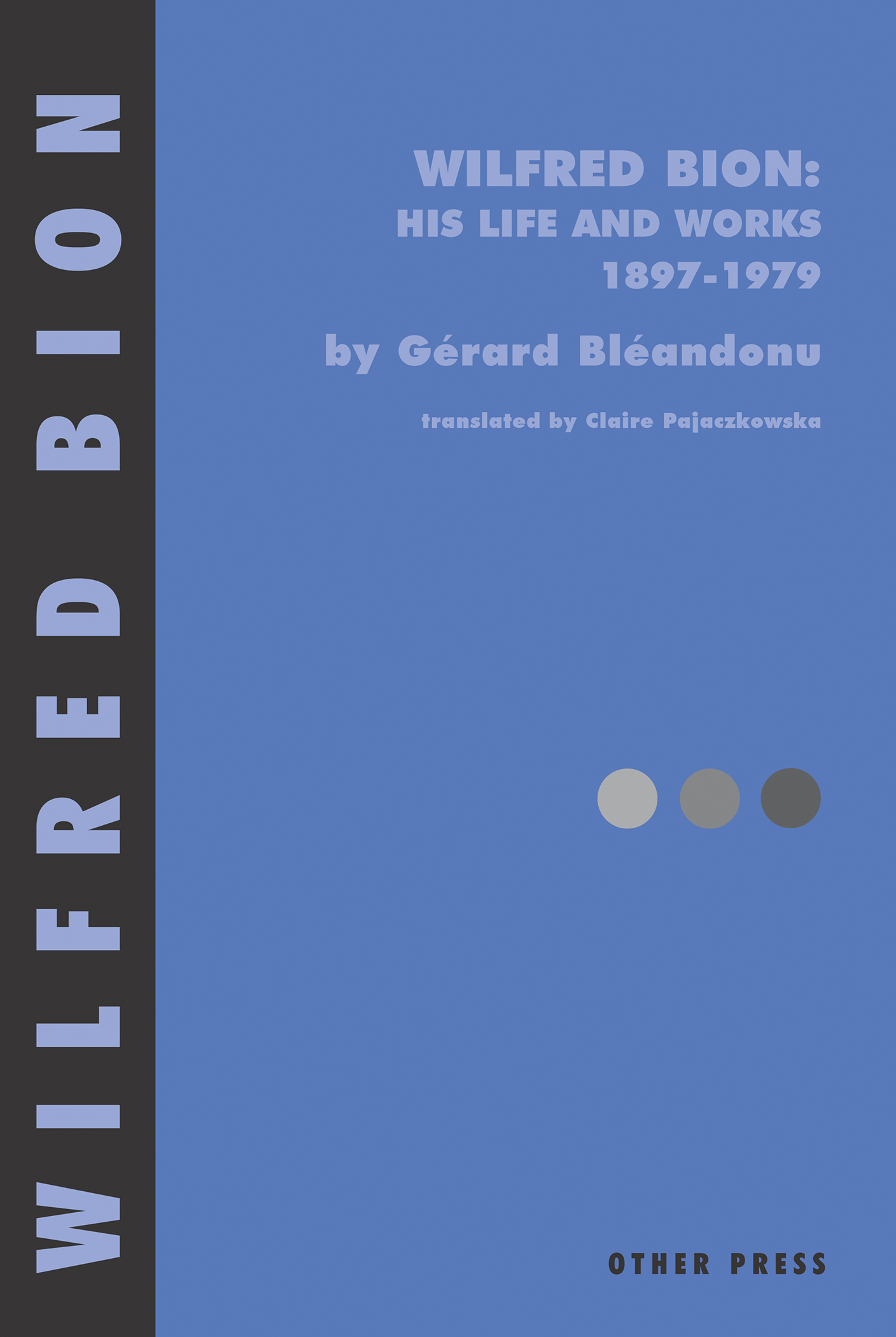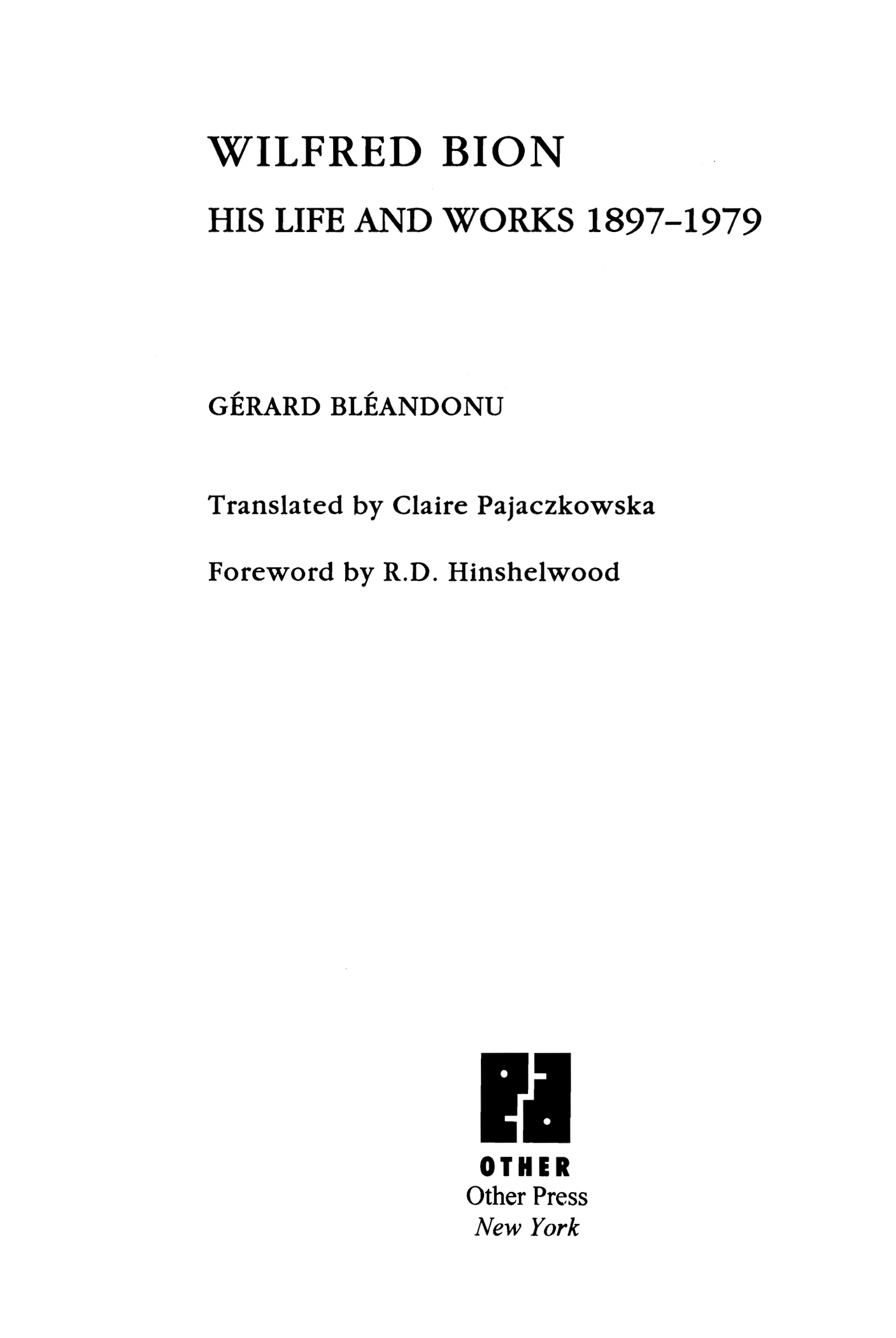Contents
Landmarks
Print Page List
Originally published in French under the title Wilfred R. Bion: La vie et loeuvre. 18971979 by ditions Bordas. Copyright 2000 Other Press LLC.
English translation 1994, Claire Pajaczkowska
Foreword 1994, R. D. Hinshelwood
ISBN9781892746573
Ebook ISBN9781635421309
Quotations from W. R. Bion, All My Sins RememberedAnother Part of a Life and the Other Side of GeniusFamily Letters, edited by Francesca Bion, 1985 by The Estate of W. R. Bion, are reproduced by permission of Mark Paterson and Associates on behalf of Francesca Bion and Karnac Books. The Grid from W. R. Bion, Attention and Interpretation, is reproduced by permission of Tavistock Publications.
All rights reserved, including the right to reproduce this book, or parts thereof, in any form, without written permission from Other Press LLC, except in the case of brief quotations in reviews for inclusion in a magazine, newspaper, or broadcast. For information write to Other Press LLC, 267 Fifth Avenue, 6th Floor, New York, NY 10016. Or visit our Web site: www.otherpress.com.
Library of Congress Cataloging-in-Publication Data
Blandonu, Grard.
[Wilfred R. Bion. English]
Wilfred Bion : his life and works, 1897-1979 / Grard Blandonu; translated by Claire Pajaczkowska : foreword by R. D. Hinshelwood.
p. cm.
Originally published: London : Free Association Books; New York : Guilford Press, 1994.
Includes bibliographical references and index.
ISBN 1-892746-57-3
1. Bion, Wilfred R. (Wilfred Ruprecht), 1897-1979. 2. PsychoanalystsGreat BritianBiography. 3. Psychoanalysts. I. Title.
RC438.6.B54 B5713 2000
150.195092dc21
[B]
00-028346
a_prh_5.6.0_c0_r0
W ILFRED B ION
This is the first full biography and the first comprehensive exposition of the most interesting and arguably the most influential figure in recent psychoanalysis. It is particularly welcome, since Bions ideas are often found to be difficult of access. There is no substitute for immersing oneself in his writings, but an introduction is surely a useful beginning, something which no one has hitherto undertaken with respect to the complete works.
Blandonu takes us through Bions personal and intellectual explorations and gives clear expositions of his key concepts, including work groups and basic assumption groups; psychotic processes; the grid; epistemology; catastrophic change; abandonment of memory and desire; the mystic; ultimate truth. Finally, he guides the reader through the fantasy writings in the Memoir of the Future, the masterpiece that is Bions autobiography and his final writings, including the posthumous Cogitations. The book is a tour de force.
G RARD B LANDONU is a community psychiatrist in a suburb of Lyon. He is the author of work on group therapy, and is writing a book about dreams.
C LAIRE P AJACZKOWSKA is Senior Lecturer, School of the History and Theory of Visual Culture, Middlesex University, and translator of Freud or Reich? Psychoanalysis and Illusion, by Janine Chasseguet-Smirgel and Bla Grunberger (Free Association Books).
R.D. H INSHELWOOD is Clinical Director, The Cassel Hospital, London, and author of A Dictionary of Kleinian Thought and Clinical Klein, both from Free Association Books.
CONTENTS
FOREWORD
R.D. Hinshelwood
Bions writing often intimidates; therefore we have a surprising hesitancy over interpreting his views. Only Leon Grinberg (with colleagues) and Donald Meltzer have gone into print in any prominent way. And that is in spite of Bions enigmatic and ambiguous way of writing; it calls for interpretative secondary sources to develop it. The many ideas which he deliberately leaves half-formulated, the evocative and limping style of his fiction-writing (if it is fiction), and the often humorous kind of gestural asides to clinical material would seem to invite being filled up with flesh and blood and passion. And indeed they do. It is what Bion intended; he wanted to work his readers so that they produced their own responses, their own hard learning, instead of his. But the task that he seems to require of his readers is so personal and idiosyncratic that there is a sense of being in the closet with him in a private contemplation. It feels unseemly to fill out the ideas in ones own way for public consumption.
What Grard Blandonu has created is a sense of the corpus of Bions work as a whole, and he has set it in an episodic sketch derived from Bions autobiographical experience of his own life. We can see here just how much Bions oeuvre transcends Freud and Klein before him, and the work of subsequent Kleinians after him. And this is because Bion was interested in the tangential task of the meaning of psychoanalysis itself in our culture, and especially within a philosophical tradition. Blandonu has done us an important service in steering a way through the philosophical interests that influenced Bion, and the sources that he drew on. Bion the philosopher comes through strongly; he was a theory-builder, and only on the way a therapeutic psychoanalyst. That estimation contrasts with the overview we have cultivated, as practising psychoanalysts and psychotherapists, in order to exploit Bions ideas in therapy. His work as a whole is balanced between the two, but leaves us bemused; too philosophical to draw together a clinical school of psychoanalysis, too clinical to make an impact on philosophers as he truly wished. Blandonu manages to sit astride the two.
The book is structured simply: an initial review of Bions childhood; a review of his work on groups, and during World War Two; the period of his work on psychotic patients; an epistemological phase; and a final and brief section on the late fictional trilogy. The first section is tantalizingly sketchy, though evocative, as in fact are Bions autobiographical texts. One day a fully researched biography will mould into a perceptible form those hesitant links we barely glimpse here: the one that peeps out occasionally from his Indian upbringing with his ayah; his psychoanalytic mysticism that involved abolishing memory and desire (surely inspired by his roots in the East); and his later entry into the 1970s culture of Los Angeles where he would once gain have encountered oriental religion and mysticism.
I suppose all biography linking formative influences and the later professional achievements is risky, especially when written for psychoanalysts; and especially, perhaps, about a psychoanalyst. Perhaps Blandonu is right to leave that mostly aside and to leave us to fill in our own surmises, just as Bion would have done. For this book stays with the achievement. The section on groups informs us of the relation between basic assumptions and the ideas of J.A. Hadfield, Bions first therapist. Bion as a Hadfieldian before he was a Kleinian is intriguing and important; but we are again left with all the questions open for us to fill in what was all this social psychology that was around at the time for the Army and its psychiatrists to use? What really is the status now of these early ideas on groups after the redrawing of group life in Bions return to groups in 1970, a much more psychoanalytic (and Bionian!) approach?
Blandonus discourse on Bions ideas about psychosis rivets us to the texts; that

